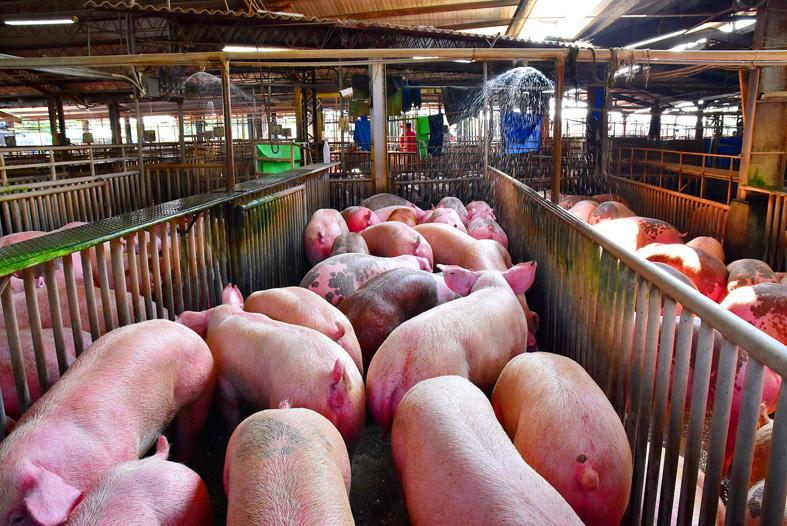Taiwan’s pork products could be sold to more countries if vaccinations against classical swine fever were no longer needed, Council of Agriculture (COA) Deputy Minister Huang Chin-cheng (黃金城) said on Saturday.
The World Organisation for Animal Health last year declared Taiwan proper, Penghu and Matsu free of foot-and-mouth disease without the need for vaccination, allowing the nation to begin exporting pork.
However, countries such as Japan still ban imports of pork products from areas with classical swine fever, including Taiwan.

Photo: Huang Shu-li, Taipei Times
To enable the nation to sell pork to more countries, the council said it is conducting a “no shots” project at more than 300 local farms.
At each farm, 16 to 24 porkets are not vaccinated against classical swine fever, but are raised with vaccinated pigs, it said, with the aim of observing whether the unvaccinated pigs become infected when they grow up, it said.
The first 3,000 “sentinel” pigs from 150 farms would soon be slaughtered, and no classical swine fever has so far been detected among them, Huang said.
The project would continue until June next year, and if everything goes smoothly, the council would evaluate whether to stop vaccinating all pigs against the virus, he said.
It is very difficult to eliminate classical swine fever, especially when it can spread to wild boars, he added.
Virus transmission is relentless among wild pigs, so it is impossible to stop vaccinations once they are infected, Huang said.
For more than a decade, no new cases of classical swine fever have been reported in Taiwan, and the fever has not been detected among wild pigs, a key factor allowing the council to initiate the “no shots” project, Huang said.
Once the nation is free of classical swine fever, its pork products could be sold worldwide, he said, expressing optimism over the prospect.

A decision to describe a Chinese Ministry of Foreign Affairs statement on Singapore’s Taiwan policy as “erroneous” was made because the city-state has its own “one China policy” and has not followed Beijing’s “one China principle,” Deputy Minister of Foreign Affairs Tien Chung-kwang (田中光) said yesterday. It has been a longstanding practice for the People’s Republic of China (PRC) to speak on other countries’ behalf concerning Taiwan, Tien said. The latest example was a statement issued by the PRC after a meeting between Singaporean Prime Minister Lawrence Wong (黃循財) and Chinese President Xi Jinping (習近平) on the sidelines of the APEC summit

Taiwan’s passport ranked 34th in the world, with access to 141 visa-free destinations, according to the latest update to the Henley Passport Index released today. The index put together by Henley & Partners ranks 199 passports globally based on the number of destinations holders can access without a visa out of 227, and is updated monthly. The 141 visa-free destinations for Taiwanese passport holders are a slight decrease from last year, when holders had access to 145 destinations. Botswana and Columbia are among the countries that have recently ended visa-free status for Taiwanese after “bowing to pressure from the Chinese government,” the Ministry

‘SIGN OF DANGER’: Beijing has never directly named Taiwanese leaders before, so China is saying that its actions are aimed at the DPP, a foundation official said National Security Bureau (NSB) Director-General Tsai Ming-yen (蔡明彥) yesterday accused Beijing of spreading propaganda, saying that Chinese President Xi Jinping (習近平) had singled out President William Lai (賴清德) in his meeting with US President Joe Biden when talking about those whose “true nature” seek Taiwanese independence. The Biden-Xi meeting took place on the sidelines of the APEC summit in Peru on Saturday. “If the US cares about maintaining peace across the Taiwan Strait, it is crucial that it sees clearly the true nature of Lai and the ruling Democratic Progressive Party (DPP) in seeking Taiwanese independence, handles the Taiwan question with extra

HEALTHCARE: Following a 2022 Constitutional Court ruling, Taiwanese traveling overseas for six months would no longer be able to suspend their insurance Measures allowing people to suspend National Health Insurance (NHI) services if they plan to leave the country for six months would be abolished starting Dec. 23, NHIA Director-General Shih Chung-liang (石崇良) said yesterday. The decision followed the Constitutional Court’s ruling in 2022 that the regulation was unconstitutional and that it would invalidate the regulation automatically unless the NHIA amended it to conform with the Constitution. The agency would amend the regulations to remove the articles and sections that allow the suspension of NHI services, and also introduce provisional clauses for those who suspended their NHI services before Dec. 23, Shih said. According to